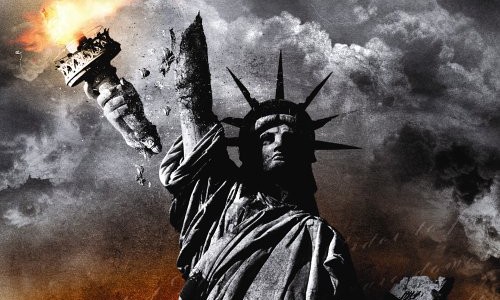By Conor Martin’s own admission, he’s “kind of an optimist”.
I’m not.
When I heard he was compiling the top five best/worst things for Liberty in 2018 and was struggling with the second half, my first thought was the problem might be too many things to choose from and figuring out where to even begin.
I got you, fam.
The following are five liberty assaults in 2018 worth mentioning:
1. Trade wars, tariffs, and protectionism

I was going to say in the introduction to the list that it was in no particular order. However, the US/China trade war is easily number one in my book. I mean, given how much I lost in the market this year, I may be biased, but I’m not the only one.
Some of the tariffs rolled out this year are US tariffs directly on China or Chinese tariffs directly on us, some just have an intentionally disproportionate effect, but it’s hard to deny that we’re in a race to the bottom with the Chinese or that Trump didn’t specifically pick this fight.
Technically, the year began with tariffs on things like 30% on solar panels (of which China is the leading manufacturer) and 20% on washing machines right out the gate in January. But the major damage kicking it all off came in March with the steel and aluminum tariffs.
March is also when Trump got even more specific that this was all about China in particular rather than hiding behind item or commodity specifics regardless of origin. He proposed tariffs on literally 1,300 categories of Chinese imports under the stated rationale that it was “a response to the unfair trade practices of China over the years”, and he seemed convinced the best response was to out-unfair trade policy them, targeting China, businesses, and consumers alike.
China predictably responded with tariffs of their own, specifically targeted to industries prevalent in areas that voted for Trump and on aluminum and steel that mirrored Trump’s first real salvo. The 128 products they taxed with tariffs included blue-collar airplanes and cars, as well as rural-area specific commodities such as pork, soybeans, fruits, and nuts.
Within days, Trump retaliated by announcing he was looking at additional tariffs on $100 billion in Chinese imports, retaliating for the retaliation on the retaliation on down the line. China has been open that their reactions have been a result of the US starting a trade war. The pattern has stuck, with new tariffs announced in May, June, July, August, and September… and the market has responded accordingly.
2. The war in Yemen, and our involvement.
 The facts of the Yemeni civil war are heartbreaking. Tens of thousands killed directly. Over 50,000 children dead of starvation or disease this year alone. According to the United Nations, 13 million Yemeni civilians face starvation in what may just be the worst famine in 100 years. Rampant war crimes, a refugee crisis… all aided by the Saudi-lead coalition which in turn is aided by the US.
The facts of the Yemeni civil war are heartbreaking. Tens of thousands killed directly. Over 50,000 children dead of starvation or disease this year alone. According to the United Nations, 13 million Yemeni civilians face starvation in what may just be the worst famine in 100 years. Rampant war crimes, a refugee crisis… all aided by the Saudi-lead coalition which in turn is aided by the US.
If these facts don’t highlight the scope and magnitude of the problem, perhaps this will: I’m forced to give Bernie Sanders credit for his successful attempt to rebuke Trump’s continued support in the Senate.
Bernie Sanders.
Through his resolution, the Senate supported a removal of US troops from Yemen. It specifically highlighted the fact that such hostilities have not been authorized by the US Congress, and that article one section eight of our Constitution leaves the responsibility of initiating war to Congress. It highlights the ways that the US has been involved in the war since March of 2015. Further, it references the different ways such US involvement has violated several sections of the war powers act.
The House, of course, is where this bill went to die.
In the hours before the vote on the most current Farm Bill, a provision was added to prevent the House from taking up the Senate’s resolution on Yemen.
Let me repeat—a measure aimed at preventing any vote in Congress on ending a multi-year foreign conflict that they did not authorize in the first place was placed at the last minute in… the Farm Bill.
If that ain’t the way of DC, I don’t know what is.
3. Liberty lost at the polls.
 Conor Martin may find some successes through his group’s “Win At The Door” campaign. Glenn Jacobs won a mayoral seat in Knox County, Tennessee (having interviewed him early about his race, I’ll take full credit). But the fact of the matter is, nearly everywhere, every liberty candidate lost and under-performed.
Conor Martin may find some successes through his group’s “Win At The Door” campaign. Glenn Jacobs won a mayoral seat in Knox County, Tennessee (having interviewed him early about his race, I’ll take full credit). But the fact of the matter is, nearly everywhere, every liberty candidate lost and under-performed.
A few months ago, I broached the subject in my interview with Eric Brakey. I asked him about how he could remain optimistic given how liberty seemed to be faring in the midterms, and we got around to discussing the first major liberty loss of the year—Nick Freitas.
“People say ‘well, Nick Freitas lost the primary’. But Nick Freitas came so close to winning that primary. He came out of nowhere, and took on a Republican who had been the statewide nominee in the past, who was incredibly well known, and he nearly won. That is a success story. Certainly, he fell short of winning the primary, but he so exceeded expectations, the liberty movement exceeded expectations in that race, and I’m sure that Nick Freitas and so many others, there’s so much more to come.”
On the other hand, he lost that primary to Corey Stewart, best known for hating immigrants, often using the word “cuck-servative”, accepting endorsements from neo-confederate and racist groups, and comparing taking down confederate monuments to ISIS. He ran his primary campaign as an “aggressive populist”, promoted theories ranging from the “birther” conspiracy to “Pizzagate”, and pushes a lot of content from white nationalists.
A narrow loss to a man like that, even in a state like Virginia, just doesn’t seem like a victory to me.
The next liberty Republican to lose, lost even harder, though not to anyone nearly as awful. The worst thing I can say about Austin Petersen is that I haven’t yet gotten a Christmas gift from him. The second worst thing I can say about him this year was that he garnered just 8% of the vote, which was disheartening to many liberty Republicans in the midwest and nationally, and gave ammo to the LP promoters who believe Republicans as a whole will never truly accept the principles of liberty.
Or at least it did until their own numbers these midterms came in. Libertarian Gary Johnson got just 15% in a state that elected him twice as a Republican governor. Sure, it was a great total for a Libertarian Senate candidate, but the expectations hinted he might even have a shot. Larry Sharpe gained the party ballot access in New York, but he did so by coming in fourth place with a percent and a half despite being a rock star nationally in the party. Two LP incumbents elected as Republicans, Laura Ebke and Brandon Phinney, couldn’t get re-elected under a different party label. Across the country, LP candidates did much worse than they had in 2016 as a general rule, and lost ballot access in more than one area.
Ron Paul-inspired Eric Brakey lost in Maine, and outside of him the liberty-leaning Republican candidates all seemed to lose their primaries before even having the chance to advance to general elections, often beat out by nationalist, populist Trump sycophants.
I know it sounds like I’m being pessimistic, but these are the facts of liberty at the polls this past year.
4. Shutdowns (for all the wrong reasons and with all the wrong results).
 In theory, libertarians, conservatives, and anarchists should love a shutdown of the federal government. In theory, communism might work.
In theory, libertarians, conservatives, and anarchists should love a shutdown of the federal government. In theory, communism might work.
In practice, government shutdowns often are more expensive than just keeping the damn thing open, temporary, and often the fear surrounding them can lead towards a greater government expansion as concessions are given to get it all back on the track of bankruptcy.
We’ve technically had three shutdowns this year, two of which stemmed directly from Trump’s preferred policy on immigration and the border.
In January, the shutdown began with an argument over DACA, a program supported by most Americans and even most Republicans. The main argument against it is more how it came to be (an executive order acting as legislation) rather than what it does (attempting to address the problem of punishing children for the crimes of their parents, specifically people brought here as children illegally).
It didn’t lead to the passage of any legislation codifying the program into an actual law, and it may be struck down for the way that it passed rather than its content.
In February, the government shut down (but only overnight, and not really). Rand Paul tried to stop the re-opening of government if it meant a bill with a trillion dollar price tag, a raising of the debt ceiling, and a slew of things that really shouldn’t have been possible with Republicans controlling both houses of Congress and the Presidency if they really represented the kind of fiscal conservatism that they claimed while running for office. In part because of even the threat of a government shutdown, Congress instead passed every one of those measures, and taxpayers are on the hook for more than they would have been without it.
And now the government’s shut down yet again, over funding for the wall. Trump has threatened to not only shut down the government, but to take responsibility for it, if he doesn’t get his way on his pet project aimed at raising spending and enacting eminent domain to fund a massive and ineffective public works project on our southern border.
5. The decay of truth and expression.
TIME magazine’s person of the year went to what it called “The Guardians”, journalists who were persecuted or at risk in one way or another for fighting back against what TIME calls “The War on Truth”. Most of these journalists were overseas, exposing the abuses of their governments, but that’s not to say these journalists are “winning” in any sense of the word.
Khashoggi is the most high-profile examples, the Saudi journalist killed and chopped up with a bone saw at the behest of their government in the Saudi consulate in Turkey. Embarrassingly, Trump refused to place any blame, despite the US Senate passing a resolution placing the blame on the Crown Prince directly.
But this was far from the only example listed, and not all retaliation was from government, despite our President declaring a fee press being the enemy of the people.
The truth is, Americans have less concern for the truth, and worldwide citizens have less access to the truths their governments want to hide. Fake news and manipulation has obscured objectivity, and especially with media being increasingly social, censorship is no longer the exclusive domain of governments.
Zucc’s Congressional hearings highlighted to the extent that information control is seen as necessary by far more than the IRA, and Zucc seems to have upped his own form of platform censorship in conjunction with other social media giants.
Without truth and it’s dissemination, without objective standards, citizens cannot make the kind of informed choices necessary to maximize liberty and governments and partisans have greater space to maximize propaganda and media manipulation.
2018 hasn’t been all bad, but the pessimists, as always, have plenty to point to.





4 comments
… [Trackback]
[…] Read More Info here on that Topic: thelibertarianrepublic.com/5-ways-liberty-lost-in-2018/ […]
… [Trackback]
[…] Information on that Topic: thelibertarianrepublic.com/5-ways-liberty-lost-in-2018/ […]
… [Trackback]
[…] Read More Information here on that Topic: thelibertarianrepublic.com/5-ways-liberty-lost-in-2018/ […]
… [Trackback]
[…] Find More on that Topic: thelibertarianrepublic.com/5-ways-liberty-lost-in-2018/ […]